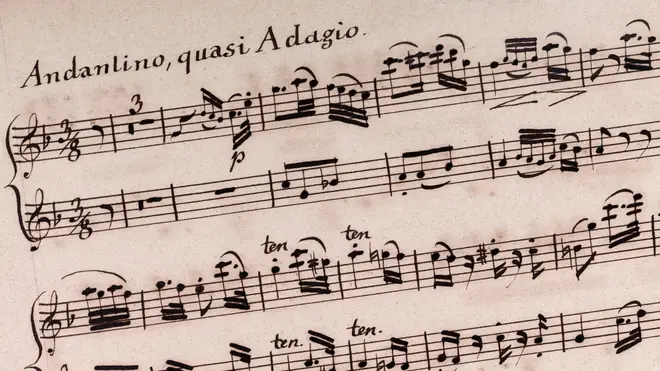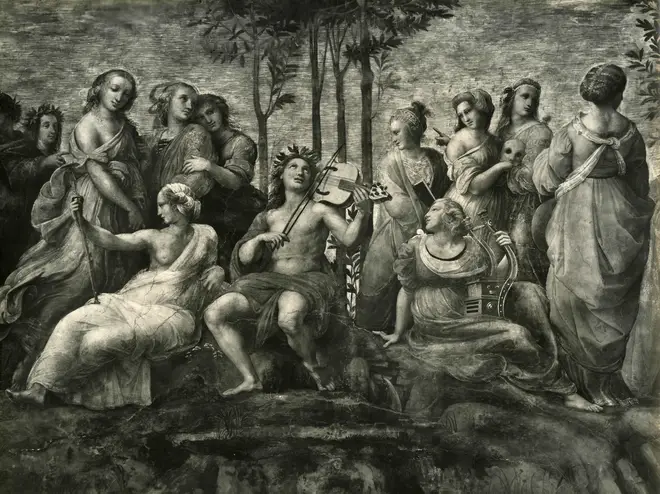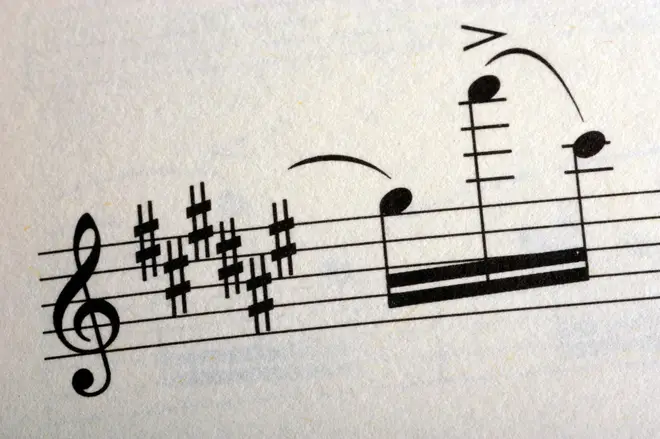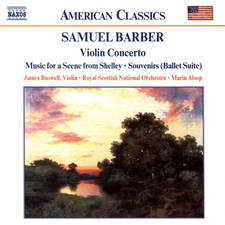What does ‘music’ mean, and what is the origin of music?
5 April 2024, 14:22

Music. We say the word every day, multiple times a day, but what does it actually mean and where does it come from? We delve into what music essentially is, and what the fundamental meaning of music has been for humanity across the ages.
Listen to this article
Greek philosopher Aristotle said, “it is not easy to determine the nature of music or why anyone should have a knowledge of it” – so abstruse its origins and true meaning are.
It doesn’t serve a literal function in sustaining life in the way that, say, eating, sleeping and breathing does. But as far as any of us can tell, music is – and always has been, always will be – a fundamental part of being human. And maybe human life actually couldn’t exist without it.
There is no known human society today, or in all of history, that hasn’t produced music in some form. It’s as integral to human expression as language is. As breathing is.
Scientists, philosophers, poets, writers and artists of all kinds, from William Shakespeare to Albert Einstein, have paid tribute to music throughout history. “If music be the food of love…”
And proudly, we follow in their footsteps. But what does the word ‘music’ mean, what are its origins and what, fundamentally, is music?
Read more: Why do we call classical music ‘classical music’?

Blind pianist Lucy stuns Royal Albert Hall with breathtaking Debussy debut
Where does the word ‘music’ derive from?
Precursors to the modern word ‘music’ include the French word ‘musique’, from the 12th century onwards, and the Old English mid-13th century word ‘musike’, both of which can be traced back to the Latin: ‘mūsica’.
The Latin word in turn comes from the ancient Greek word,‘mousiké’, which translates literally as ‘art of the muses’.
In Ancient Greek mythology, the muses were nine goddesses who were the source and knowledge of all literature, science, and the arts.
Read more: 24 inspirational quotes about music
Who were the nine muses?
The nine muses were the Calliope (epic poetry), Clio (history), Euterpe (double-pipes and music), Erato (love poetry and lyric poetry), Melpomene (tragedy), Polyhymnia (hymns and sacred poetry), Terpsichore (dance), Thalia (comedy and pastoral poetry) and Urania (astronomy).
Distinct from how we think of ‘muses’ in modern times, the nine muses weren’t the subject of an individual’s artistic inspiration, but rather the direct source of knowing, understanding and practising all arts and sciences.
The role of the nine muses has largely been defined by the tales Homer and Hesiod, and over time the myths of their powers have changed. Polyhymnia, for example, started to be seen as residing over music more than any other muses as time passed.
It’s immediately apparent the ancient Greek word was a lot more generic and all-encompassing than what we use ‘music’ for today, which is taken universally to refer almost exclusively to sound.
And the study and practice of music, for ancient Greeks, was important and blended into wider lives and life sciences: Pythagoras (of triangle Pythagoras theorem fame) gathered music into his mathematics department, and was the first musical numerologist and acoustician, linking sounds with lengths in string, for example – something that isn’t too many steps away from a conception of vibrations, sound waves, wavelengths and pitches.

What is the simple definition of music?
Put simply, music is humanly-organised sound, usually made for the purpose of emotional expression or achieving beauty.
Music, this set of humanly-organised sounds, is usually structured according to a set of established practices and cultural standards based around rhythm, melody, and harmony.
A folk song passed from one village to the next in 13th-century England is music; Schoenberg’s Pierrot Lunaire is music; the Bee Gees’ ‘Stayin’ Alive’ is music.
Music has been used in rituals, including ceremonies and religious services, for centuries, and it’s also traditionally a form of entertainment, existing for its own sake and also as accompaniment to a distinct artform, for example for theatre and, in modern times, in radio broadcasts, silent and synchronised film, for television, and in internet content.
In religion and ceremonies, music plays a role in helping those who create or encounter it to have greater reverence towards that religion or occasion – or indeed political cause, when music is used for political ends.
When used for film and theatre, music’s role can be seen more as an emotion-driving one. Its ability to reflect or draw out, and fundamentally influence, human emotion is used to powerful effect.
Perhaps music’s two main functions, viewed next to each other like this, aren’t so different after all.
Instruments are a primary source of music-making, cropping up as a frequent component of ritual throughout history. As is the human voice. Singing, like all music, seems to be a fundamental part of being human.
Read more: 10 pieces of classical music that will 100% change your life

Malakai Bayoh sings angelic 'Amazing Grace' in a stunning London church
What is the origin of music?
Where music actually came from is as endlessly debatable as a Netflix documentary-sparked conspiracy theory. Some scholars believe music is a natural extension of language, and as essential to successful human existence as the development of verbal communication, while others believe it evolved to serve a more specific function.
Evolutionist Charles Darwin, in one of the earliest theories of where music comes from, proposed that music could have evolved in a similar way to mating calls in the animal kingdom.
It’s clear that life could technically function without music, but it’s beneficial for the secondary elements of pleasure seeking – we simply enjoy, so came to make, music – as well as for social cohesion and communication, all things that are indirectly crucial for staying alive.
Read more: 10 incredible benefits of listening to classical music
What are the main elements of music?
When humans organise sound into what we discern as music, the key elements are rhythm, melody, and harmony.
Rhythm refers to a repeated pattern of sound, which remains constant over a set period, and often uses a single pitch. In modern music, rhythm is often provided by drums or percussion instruments, and by bass instruments which produce low frequency pitches.
A melody is the tune; the main part of the music that our ears pick up and we hum (sometimes subconsciously!). Think of your favourite song. Now hum it. What you’re humming is the melody – the single line of pitches with which you can identify a particular song or piece of music.
Sometimes it is useful to think of melody as the linear, or horizontal, way the music progresses.
Harmony, in direct contrast, is the vertical way the music is constructed. Harmony is dictated by what chords the music is built from, and chords can be understood as combinations of notes played at the same time, derived from all of the major and minor scales. Specific chords, and chord progressions, form the keys in music.
Read more: What are the keys in music?

Rhythm, melody and harmony influence what style, what flavour, music has. And different styles fall into wider genres, and subgenres, until you zoom out and look at loose categories, like classical music (broadly defined as Western music that's distinct from pop, jazz, or folk music), versus popular music.
Certain styles and genres of music develop in line with trends in society. Music is shaped by war, by politics, and by pop culture movements.
Think of punk rock emerging to push back against the political and social establishment, the “mainstream”. And think of hip-hop’s evolution as a powerful way for American and British Black, Latino, and Caribbean communities to express their stories and create balm in their lives while driving wider cultural developments, like the emergence of rapping, DJing, breakdancing, and visual expression in the form of graffiti and street art.

Conductor Gustavo Dudamel on music education and the magic of Latin American music
Has music ever been banned?
Given its potent intersection with, and ability to drive, social evolution and cultural revolution, some music has been viewed with suspicion by those in power.
Although music is integral to human existence, it has for this reason been banned and censored throughout history.
Read more: 9 powerful images of music’s role in protest and conflict
All music, apart from that used for propaganda purposes, was banned during the dictatorship of the Khmer Rouge in Cambodia, and between 1996 and 2001, the Taliban government in Afghanistan banned all Western technology and art, including music.
Other dictatorships, including that of Hitler and the Nazi party in Germany, have controlled and censored music, and many forms of music were banned over the years in communist Russia.
Going back to the 16th century, and the rule of the English protestant Puritans, choral music and musical instruments were banned in religious services, because they were associated with the similar but opposing religion of Roman Catholicism.
Certain songs are censored and banned regularly in countries all over the world, often due to what’s deemed as offensive language or potentially harmful meanings. Once times change, these songs – often what are later on universally considered to be great songs – are re-released in society, either deliberately or by people’s refusal to let them die.
And let them die, we mustn’t. Imagine a world without music.
The attempt to control it to this extent speaks only of music’s potency and importance in human lives.
A reason, perhaps, that our ancestors attempted to explain its origins, and leave it sitting safely under the wing of nine sacred, untouchable deities.









































